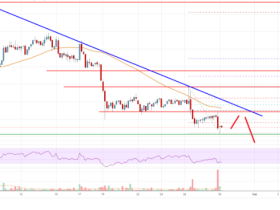The number of financial and cryptocurrency pyramid schemes that are targeting Russian investors is expanding, and more and more of these schemes are building actual offices in the nation. Recent statements made by the Russian Central Bank have voiced their concern with the trend, which is interpreted as evidence that those perpetrating the fraud anticipate an increase in demand.
According to the Bank of Russia, Russian crypto scams are opening offices in an effort to attract more investors personally.
According to a report by the daily Izvestia, which cited the Central Bank of the Russian Federation as its source, illegal forex dealers and financial pyramid schemes in Russia are moving offline. Many of these schemes now specialize in providing opportunities for cryptocurrency investment and settlement (CBR).
For the first time in recent years, the perpetrators of these scams are opening offices from which they attempt to persuade potential victims to invest in virtual currency or suggest services to bypass foreign sanctions and government restrictions. These offices have been opening up all over the world in recent years. Experts agree that having that conversation in person is by far the most effective approach to accomplish that goal.
They also caution about the dangers of providing information with shady platforms, which can frequently result in the loss of funds (either fiat or cryptocurrency). According to the report, the growing tendency of staying offline is an indication that con artists are getting ready to meet an increased demand because it has become exceedingly difficult for Russians to gain access to global financial assets.
The increase in interest in crypto assets can be attributed to the imposition of sanctions on Russia by the West in reaction to Moscow’s invasion of Ukraine as well as limits placed on the use of foreign currencies by the Russian government. Many people in Russia have started purchasing bitcoin (BTC) and other cryptocurrencies and stablecoins as a means of shielding their money from the effects of government action or moving it outside of the country.
As a result of sanctions and restrictions, the amount of fraudulent cryptocurrency activity is growing.
The data produced by the Bank of Russia show that the activity level of financial pyramid schemes has significantly increased this year. The regulatory body found 954 of these organizations during the first half of the year 2022, as opposed to only 146 during the same time period the previous year. That’s an increase that’s more than six times as large.
The number of people proposing investments in fictitious or genuine cryptocurrencies has also been steadily increasing over recent years. More than half of the fraudulent schemes that were reported (56 percent, or 537 different entities types) either solicited donations in the form of various digital assets or marketed investments in those assets.
As a result of the sanctions, which are having an effect on international settlements and investments in foreign assets, Russia’s monetary authority believes that fraudsters are taking advantage of the drastically changed operations of traditional financial institutions. These operations have been drastically changed as a result of the sanctions.
The Central Bank of Russia (CBR) has lately relaxed some of the limits that were placed on Russian residents’ access to foreign fiat currency. This has made it possible for banks to boost the amount of U.S. dollars and euro cash that is available to the general public. It is not yet apparent how the adjustment would affect interest in cryptocurrency, which, according to a recent survey, is expected to stay reasonably high in Russia.
Bank of Russia, CBR, Central Bank, Crypto, Crypto Fraud, Crypto Pyramids, Crypto Scams, Cryptocurrencies, Cryptocurrency, fraudsters, Investors, Offices, Offline, Russia, Russian, Russians, Scammers, Scams, Websites, Bank of Russia, CBR, Central Bank, Bank of Russia, CBR, Central Bank, Crypto, Crypto Fraud, Crypto Pyramids, Crypto Scams, Cryptocurrencies, Cryptocurrency, fraudster
Do you believe that there will be an increase in the number of crypto-related pyramid schemes in Russia? Leave your feedback in the comments section below regarding your thoughts on the matter.
“Being a writer is what I am, rather than what I do,” is a remark from Christopher Hitchens that resonates with Lubomir Tassev, a tech-savvy journalist from Eastern Europe who works as a journalist. In addition to cryptocurrencies, blockchain technology, and financial technology, international politics and economics are two more areas that serve as sources of inspiration.










 Bitcoin
Bitcoin  Ethereum
Ethereum  Tether
Tether  Solana
Solana  USDC
USDC  Lido Staked Ether
Lido Staked Ether  XRP
XRP  Dogecoin
Dogecoin  Toncoin
Toncoin  Cardano
Cardano  Shiba Inu
Shiba Inu  Avalanche
Avalanche  TRON
TRON  Wrapped Bitcoin
Wrapped Bitcoin  Bitcoin Cash
Bitcoin Cash  Polkadot
Polkadot  Chainlink
Chainlink  NEAR Protocol
NEAR Protocol  Polygon
Polygon  Internet Computer
Internet Computer  Litecoin
Litecoin  Uniswap
Uniswap  LEO Token
LEO Token  Dai
Dai  First Digital USD
First Digital USD  Hedera
Hedera  Stacks
Stacks  Ethereum Classic
Ethereum Classic  Aptos
Aptos  Mantle
Mantle  Cronos
Cronos  Stellar
Stellar  Cosmos Hub
Cosmos Hub  Render
Render  Filecoin
Filecoin  OKB
OKB  Pepe
Pepe  Immutable
Immutable  Bittensor
Bittensor  Renzo Restaked ETH
Renzo Restaked ETH  XT.com
XT.com  dogwifhat
dogwifhat  Arbitrum
Arbitrum  Maker
Maker  The Graph
The Graph  Optimism
Optimism  Wrapped eETH
Wrapped eETH
Leave a Reply